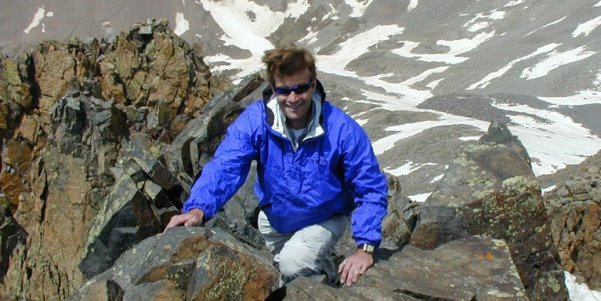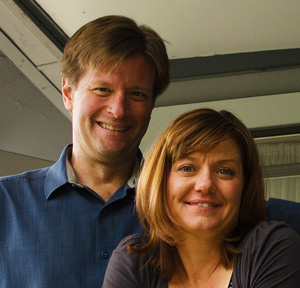This is the fourth in a series of candidate profiles written by students in Instructor Jeff Browne’s CU News Corps course at CU-Boulder. Lars Gesing is a graduate student from Hamburg, Germany, where he worked for several print and online publications, including the daily regional newspaper Hamburger Abendblatt.
When Sam Weaver talks about the single most important issue that worries him, he talks about climate change. And he talks about “how we are going to create a future for our children and grandchildren that is as good as possible.”
Weaver is making a run for a seat on City Council for the first time this year.
His support for the city’s municipalization efforts are very much in line with the 47-year-old being the CEO and co-founder of a Boulder-based clean energy startup called Cool Energy, Inc.
Boulder was right to adopt the goal of reducing carbon emissions by 80 percent until 2050, he says, “because we have the means to do so. Not only do we have the technological know-how and the will of a progressive community, but we have the ability to put this kind of thing in place and if it does turn out to cost a little more, we can afford it.”
The unknown costs that come along with the municipalization process—one of the most emphasized arguments of those who oppose the project—shouldn’t scare voters, Weaver believes. He says that the costs to shift to renewables are going to be offset by running an electrical system “without a profit motive in the middle of it.”
Former City Council member Steve Pomerance’s stance on the municipalization debate is very much in line with Weaver’s approach. He says: “Energy is a very profitable business and Xcel has a monopoly. We need to start worrying about climate change. And Xcel doesn’t do that.”
Leslie Glustrom, co-founder of the non-profit group Clean Energy Action, is another advocate of Weaver’s position. She passionately speaks against those who anticipate higher energy costs once the municipalized utility is implemented. “After over 1000 detailed modeling runs of the economic consequences of creating a renewable-energy-dominated utility, we can say with confidence that Boulder can provide electricity that is not only cleaner, but cheaper,” Glustrom says.
Crystal Gray, also a former City Council member, says that Xcel is “chained to coal and just built a new 1.2 billion dollar coal plant that will run until 2069 and will contribute to excessive carbon emissions until that time.”
Implementing a municipal electric utility or a substantially restructured agreement with Xcel to perform a rapid switch to renewables could reduce carbon emissions up to 50 percent within five to seven years, Weaver says.
However, not every key player in the city is that optimistic.
John Tayer, president and CEO of the Boulder Chamber of Commerce, warns that “it is important to continue considering alternatives to municipalization which achieve the city’s clean energy, reliability, and rate goals through less risky paths.”
“Have Boulder be more like Boulder”
Having been a volunteer firefighter for the Sugarloaf Fire Department for 15 years, including two as chief, Weaver learned how to adapt to the impacts of climate change that are, as he puts it, “already locked into our system.”
Professionally, he now concentrates on the concept of mitigation, trying to set a model for the future. Cool Energy Inc. was the brainchild of a 2005 Christmas business-idea brainstorming session Sam Weaver had with his father, who started almost a dozen businesses over the course of the past decades.
Weaver, his wife Maggie and their two black cats Midnight and Morocco live in the Whittier neighborhood. He is careful when thinking about whether or not Boulder should become denser. “Density needs to meet the needs of the specific neighborhoods,” he says.
Ray Bridge, co-chair of PLAN-Boulder County, is in accord with this approach. He argues that “increasing density in some places can often represent good planning, particularly if it is concentrated among transportation corridors, but retaining the neighborhood character is often important to Boulder residents.”
“I think you have to be careful that you don’t try to apply the same urban type to every place in the city. The goal isn’t to turn Boulder into Manhattan, but to have Boulder be more like Boulder,” Weaver agrees.
Along with the density debate go different efforts on how to add more affordable housing to the city’s architectural landscape.
“Many attractive places in the world face the challenge of very high median home costs,” Weaver says, elevating Boulder to the illustrious circles of world-renown destinations like New York City.
“Boulder is a very desirable place to live. Adding more housing doesn’t solve the problem. We need more programs for permanently affordable housing. The city needs to spend money on buying houses and setting the rent,” says Steve Pomerance.
Weaver disagrees. He is not in favor of rent control: “Look at how San Francisco and New York City have failed with it. For a few people, it is a very good deal. For many people who are trying to get into the housing market, it is not.”
Eighteen 14ers, now off to new heights
His love for the outdoors and a decent job market was what led Weaver, who was born in Knoxville, Tenn., to Colorado after graduating from the California Institute of Technology. The passionate runner, mountain biker and skier who also climbed eighteen 14ers lived among various communities in the foothills before finally moving into the city limits of Boulder in 2008.
With solar panels on his house and a regular bike commute, Weaver tries to take steps toward more sustainability in his own life, too. “We can all do better,” he says.
It therefore doesn’t come as a surprise that Weaver has—as do so many of his fellow City Council candidates— a strong opinion on the issue of transportation.
Weaver argues that it is “a regional problem that ultimately requires regional solutions.” He says that commuters need to be given options, for example by providing county-wide EcoPasses, financed by a new tax that voters would ultimately have to decide about.
“Another way to get people out of their cars is when it is hard to park or when it costs money to park,” Weaver proposes. He favors pilot projects that include businesses who are willing to cooperate. In return, he wants to offer them alternatives like the EcoPass.
Parking management proposals are viewed with skepticism within the business community though.
While Chamber of Commerce President John Tayer thinks that “parking fees can be an appropriate way to recover the cost to build and maintain parking and help reduce congestion under certain circumstances,” he also believes that “the use of parking fees as a tool for promoting alternative transportation use should not be implemented lightly.” He demands a thorough evaluation and stakeholder involvement in determining when and where parking fees might be appropriate.
Sue Prant, director of Community Cycles, a Boulder-based non-profit bike collective, notes that “many areas in town still have poor access to transit. Until that is improved, the vast majority of people will still drive, free bus or not, because the bus just isn’t very convenient.”
Former City Council member Steve Pomerance says the real problem is the in-commuters, not those people who live within city limits. “The only way to get them out of their cars is by starting to charge for driving and by charging fees for parking while handing out EcoPasses.”
Stronger focus on the problem of large homeless population
While Weaver thinks that transportation is currently the most underfunded program in the city, he also sees deficits in social services.
“We have a significant homeless problem that we need to address,” he says. While he wants to enhance services for those “who want to become a productive part of society” or who face mental health challenges, he also favors stricter policies for those who choose to live on the streets as part of a lifestyle decision.
“The city shouldn’t dictate lifestyles for everyone. It should just have standards of behavior that need to be complied with,” Weaver says, adding that the part of the homeless population who made a lifestyle decision “poses risks and challenges to other groups which is why I don’t think it is fair or appropriate for one group to monopolize open space.”
Though Weaver and his wife don’t have children, his campaign is devoted to the next generation. With 12 nieces and nephews, three of them living in Boulder, he is trying to help create an environment for them that is as healthy as it can be.
Weaver says: “We will never get back to where it was when I was growing up. But they are the ones who have to deal with the impacts that are going to be seen.”





